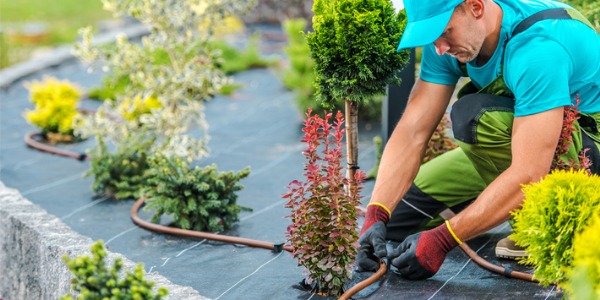What is an Irrigation Technician?
An irrigation technician installs, maintains, and repairs watering systems that help plants, lawns, and landscapes stay healthy. These systems can include sprinklers, drip lines, timers, and pumps. Irrigation technicians make sure the right amount of water is delivered to the right places, which helps conserve water and keeps plants growing well.
They often work in places like parks, sports fields, golf courses, farms, or residential yards. Their job involves digging, working with pipes and valves, adjusting sprinkler heads, and checking for leaks or broken parts. They may also program and troubleshoot automatic systems to make sure everything runs on schedule and works efficiently.
What does an Irrigation Technician do?

Duties and Responsibilities
The duties and responsibilities of an irrigation technician can vary depending on the specific job, industry, and employer. However, here are some common tasks that irrigation technicians are typically responsible for:
- System Installation: Install irrigation systems by digging trenches, laying pipes, and connecting sprinkler heads, valves, and controllers. Follow blueprints or layout designs to ensure proper coverage and efficiency.
- Routine Maintenance: Perform regular system checks to clean filters, adjust spray patterns, and replace worn-out parts. This helps prevent small issues from becoming bigger problems and keeps the system running smoothly.
- Troubleshooting and Repairs: Diagnose and fix common issues like leaks, broken sprinkler heads, blocked lines, or electrical problems in controllers. Use tools and testing equipment to ensure accurate repairs and restore full system function.
- System Programming: Set up and fine-tune automatic watering schedules using timers or smart controllers. Adjust run times and frequency based on seasonal changes, plant types, and soil conditions to avoid over- or under-watering.
- Water Conservation: Monitor the system to detect areas of waste or inefficiency and make necessary changes, such as switching to drip irrigation or adjusting sprinkler angles. Recommend water-saving practices to clients.
- Recordkeeping and Reporting: Maintain accurate records of service visits, repairs made, parts used, and system changes. These records help track system performance and meet any reporting requirements for large properties.
- Customer Communication: Talk with property owners or managers to explain how the system works, suggest improvements, and answer questions about proper watering practices and system care. Clear communication helps build trust and ensures client satisfaction.
Types of Irrigation Technicians
There are different types of irrigation technicians, each focusing on specific areas depending on the setting and type of system they work with. Their roles may vary, but all are essential to keeping irrigation systems efficient and effective.
- Residential Irrigation Technician: Works on home irrigation systems, installing and maintaining sprinklers and drip lines to keep lawns and gardens healthy.
- Commercial Irrigation Technician: Handles larger systems for office buildings, shopping centers, and apartment complexes, often managing more complex layouts and higher water demands.
- Golf Course Irrigation Technician: Specializes in maintaining irrigation systems for golf courses, ensuring that greens, fairways, and tees receive precise amounts of water.
- Agricultural Irrigation Technician: Focuses on farm irrigation systems, including drip, pivot, and flood irrigation, to support crop growth and maximize water use.
- Landscape Irrigation Technician: Works on irrigation systems for parks, public spaces, and large landscaped areas, often collaborating with landscapers and groundskeepers.
- Irrigation Controls Technician: Specializes in programming and troubleshooting advanced irrigation controllers and sensors, often using smart technology and weather-based systems.
What is the workplace of an Irrigation Technician like?
The workplace of an irrigation technician is mostly outdoors, often in places like residential yards, commercial properties, farms, golf courses, or public parks. They spend much of their time working in the soil, digging trenches, laying pipes, and installing or fixing sprinklers. Because the job is hands-on and physical, technicians are usually on their feet, using tools and equipment throughout the day.
Working in different weather conditions is a normal part of the job. Irrigation technicians may work in the sun, heat, rain, or cold, depending on the season and location. The work can be physically demanding, involving lifting heavy materials, bending, kneeling, and sometimes working in tight or muddy spaces. Safety gear, such as gloves and protective eyewear, is often used to stay safe on the job.
Although most of the work is done outdoors, irrigation technicians may also spend some time indoors planning systems, updating records, or programming irrigation controllers. They often work independently but may also be part of a team, especially on larger projects. Communication with clients, supervisors, or coworkers is important to make sure the system works properly and meets the needs of the property.
Frequently Asked Questions
Irrigation Technician vs Irrigation Specialist
Irrigation Technician
An irrigation technician is typically a hands-on field worker responsible for installing, maintaining, and repairing irrigation systems. They work directly with equipment, digging trenches, laying pipes, connecting sprinkler heads, setting up timers, and troubleshooting leaks or electrical issues. They often follow plans created by specialists or designers, making sure systems operate efficiently and meet local codes. Technicians may work for landscaping companies, golf courses, municipalities, or agricultural operations.
Irrigation Specialist
An irrigation specialist is generally more experienced and often focuses on design, planning, and optimization rather than just installation. They might analyze soil, plant needs, and water use to design efficient systems, create irrigation schedules, and use smart controllers or sensors to improve water efficiency. In larger organizations, they may supervise technicians, train crews, manage budgets, or consult on complex projects such as sports fields or agricultural systems. Some specialists are certified through professional bodies like the Irrigation Association (IA).
If you’re considering a career in this field, technician roles are a great entry point. With more training, certification, and experience, you can move into a specialist or designer position.
Irrigation Technicians are also known as:
Irrigation Installer
Certified Irrigation Technician